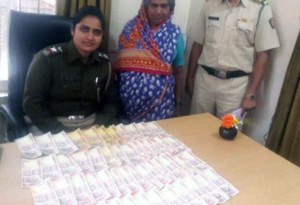Pune, Nov 10: A waste picker here today came across a bag full of Rs 1,000 notes totalling upto Rs 52,000, two day after the demonetisation of the currency of these denominations.
The elderly woman ragpicker, who chanced upon the cash in a plastic bag, however, immediately alerted her supervisor who in-turn informed the police of what she found.
Police said the incident took place in one of the by-lanes of Law College Road here this morning.
"Shanta Ovhal, who is working with the civic body, was segregating the waste this morning in one of the by-lanes of Law College Road, where she found a plastic bag," an officer attached to Deccan-Gymkhana police station said.
"To segregate the waste, she opened the bag and was shocked as she saw currency notes in denominations of Rs 1,000 along with some waste in the bag," he said.
The woman then informed about it to her supervisor."Later, they approached the police and submitted the bag, full of demonetised currency notes," the officer said.
"We are investigating who had left the bag in the waste and also probing the genuineness of the recovered notes," he added.
On Tuesday evening, Prime Minister Narendra Modi had announced that high denomination notes of Rs 500 and Rs 1,000 will no longer be legal tender, in a bid to fight against black money and create a "corruption-free" India.




Comments
When are citizens getting their 15 Lakhs....cleaning black money in India, agreed...at the same time we need to see how government is going to clean black money stocked in foreign countries too.....
Add new comment